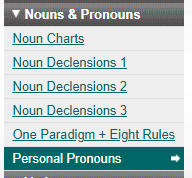
Here are my full analysis worksheets. You may not need to bother looking at them. But they are here if you want them. They go along with my translation comments in the videos below.
While there are many Greek verbs with irregular forms (εἰμί, for instance—"to be"), we are going to focus for now on regular verbs, which have consistent endings.
The simplest verb to use in illustrating Greek verb-endings is λύω, "to loosen", "to release", or "to untie". This is the verb used in these verses:
- Lk. 19:30 telling them, “Go to the village ahead of you. When you enter it, you will find a colt tied there that has never been ridden. Untie it and bring it here.
- Acts 22:30 The next day, because the commanding officer wanted to know the true reason Paul was being accused by the Jews, he released him and ordered the chief priests and the whole council to assemble.
We will add verb endings to our charts below as we encounter new verb forms in our study of Acts. For now, I want you to notice these verb forms that we have already translated:
Present Active Indicative
Singular Plural 1st person λύω I untie 2nd person λύετε You untie 3rd person λύει He/she/it unties λύουσι(ν) They untie If you know the present tense endings, the future is easy. You just start the word-ending with a sigma σ.
Future Active Indicative
Singular Plural 1st person λύσω I will untie 2nd person λύσετε You will untie 3rd person λύσει He/she/it will untie λύσουσι(ν) They will untie
Examples of These Verb Forms We Have Seen in Our Recent Translation Work
οὐ γὰρ ὡς ὑμεῖς ὑπολαμβάνετε οὗτοι μεθύουσιν.
For these people are not drunk as you are assuming. (2:15)
2nd Person Plural Present Active Indicativeοὐ γὰρ ὡς ὑμεῖς ὑπολαμβάνετε οὗτοι μεθύουσιν.
For these people are not drunk as you are assuming. (2:15)
3rd Person Plural Present Active Indicativeλέγει ὁ θεός
...God says, (2:17)
3rd Person Singular Present Active Indicativeπροφητεύσουσιν οἱ υἱοὶ ὑμῶν
Your sons...will prophesy. (2:17)
3rd Person Plural Future Active Indicative
One word (or family of words) that you run into all the time is the personal pronoun. The various forms of ἐγώ are irregular. So you must simply buckle down and learn them. You will find the material immediately below also appears in the "Nouns" section from the menu.
